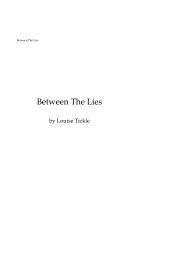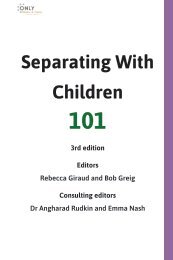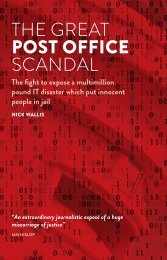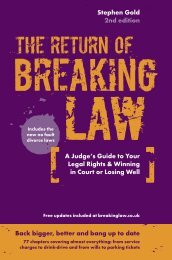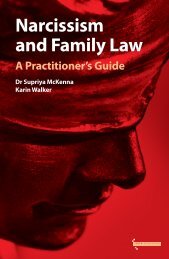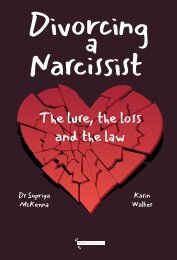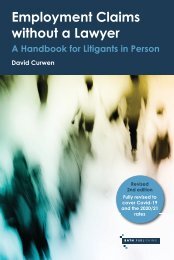Insolvency Made Clear: A Guide for Debtors
Plain English, practical guidance for anyone facing demands over a debt they are struggling to pay.
Plain English, practical guidance for anyone facing demands over a debt they are struggling to pay.
You also want an ePaper? Increase the reach of your titles
YUMPU automatically turns print PDFs into web optimized ePapers that Google loves.
<strong>Insolvency</strong> Law <strong>Made</strong> <strong>Clear</strong> – A <strong>Guide</strong> For <strong>Debtors</strong><br />
at fault. The guidance recognises that a person may be made bankrupt through<br />
little or no fault of their own if they were the victim of the poor business decisions<br />
of others.<br />
The guidance and the <strong>for</strong>m are not clear on how the Home Office treats other<br />
<strong>for</strong>ms of insolvency procedure other than bankruptcy, such as entering into an<br />
Individual Voluntary Arrangement. Since individuals who sign an IVA will be<br />
on the public insolvency register alongside bankrupts, the Home Office is likely<br />
to notice. The Secretary of State has wide discretion when applying the good<br />
character test, and would be entitled to consider the effect of an IVA. However,<br />
the accurate answer to question 3.14 is ‘no’.<br />
For more in<strong>for</strong>mation on applying <strong>for</strong> citizenship, the reader is directed to the<br />
CLP Legal Practice <strong>Guide</strong>s on Immigration Law.<br />
2.12 After-acquired property<br />
While a debtor is still an undischarged bankrupt, they must notify the Trustee<br />
if they acquire any additional property or if there is an increase in their income<br />
within 21 days of receiving it (r10.125(1)). They cannot dispose of it without<br />
the Trustee’s consent until 42 days after giving notice, and if they do they have a<br />
duty to disclose the name to whom they disposed of the property, <strong>for</strong> the Trustee<br />
to decide whether to attempt to recover it. Failure to comply with this section<br />
without a reasonable excuse is contempt of court (s333(4) of the Act).<br />
This provision is intended to capture cases where the bankrupt receives a windfall:<br />
<strong>for</strong> example, they win the lottery or receive an inheritance. If the amount is<br />
substantial (in practice, more than a few hundred pounds) the Trustee is likely<br />
to distribute it to the creditors rather than allow the bankrupt to keep it <strong>for</strong><br />
themselves. The Trustee cannot acquire any income of the bankrupt which they<br />
earned following the bankruptcy order by notice (s307(5)). Instead, the Trustee<br />
will have to apply <strong>for</strong> an income payment order or make an income payment<br />
agreement with the bankrupt.<br />
2.13 Income payments orders<br />
Only property which falls within the bankrupt’s estate gets transferred to the<br />
Trustee. The bankrupt’s estate is defined in terms of property belonging to the<br />
bankrupt when the bankruptcy order is made (s283(1)). This means that future<br />
income does not automatically belong to the Trustee.<br />
However, the Trustee has the power to apply <strong>for</strong> an income payments order<br />
(IPO) under s310 of the Act. This is an order which claims any income received<br />
by the bankrupt beyond the amount needed to satisfy their reasonable domestic<br />
needs and the needs of their family. ‘Income’ here includes business income,<br />
30



